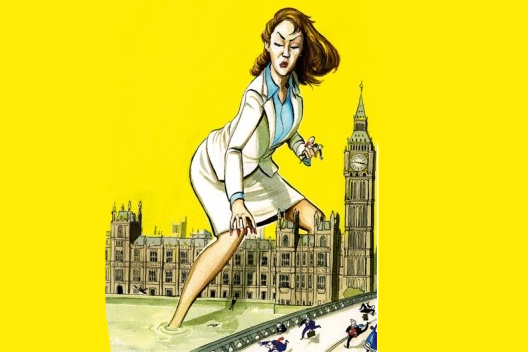With his token women, Corbyn has done a Cameron
written for The Spectator, 15 September 2015
 In the early hours of Monday, it dawned on Jeremy Corbyn that no women in his team would be shadowing the four Great Offices of State. ‘We are taking a fair amount of shit out there about women,’ his advisor Simon Fletcher was heard saying. ‘We need to do a Mandelson. Let’s make Angela shadow first minister of state. Like Mandelson was. She can cover PMQs.’
In the early hours of Monday, it dawned on Jeremy Corbyn that no women in his team would be shadowing the four Great Offices of State. ‘We are taking a fair amount of shit out there about women,’ his advisor Simon Fletcher was heard saying. ‘We need to do a Mandelson. Let’s make Angela shadow first minister of state. Like Mandelson was. She can cover PMQs.’
Of course, if you’re reading this, and you’re a deep-set Corbynista, I doubt you believe a word of it: it’s the testimony of Darren McCaffrey, Sky reporter, spawn of the evil Murdoch empire.
Therein lies the central challenge of our polarised body politic. How can any of us attempt the open debate a healthy society requires, when we have ceased to speak the same language, let alone trust the same sources? In this maelstrom of bad faith, the left are understandably bemused when anyone even associated with the right raises concerns about the representation of women in Corbyn’s shadow cabinet.
In good faith, then, let’s talk about the Tories, too. In July of last year, after David Cameron had aggressively briefed that his reshuffle would focus on promoting women, Melissa Kite wrote in The Spectator:
‘maybe this is because he is the sort of old-fashioned Tory who deep down, in spite of the rhetoric about valuing women for their abilities, believes that a woman’s place is in the PR strategy.’
Cameron’s feminist fanfare was faux: he only appointed a few new women to cabinet ministries. But he played an old trick, appointing more women without ministerial infrastructure to ‘attending cabinet’ status, where they sat, literally, on the furthest ends of the table from the PM and were allowed to listen quietly to the boys.
A slew of women visited Downing Street just in time for the lunchtime live camera bulletins. Each ultra-televised woman – Claire Perry, Priti Patel, Anna Soubry and Penny Mordaunt – was invited to No 10 for 12pm, yet they were only being given a junior ministry. So much for equality.
But now it’s Jeremy Corbyn’s turn to patronise the girls. He promises that all ministries in his shadow cabinet are equal, (though some are more equal than others, groan). No matter that no Labour woman will shadow the Great Offices, which still convey fixed privileges and high-profile question spots in Parliament that even Corbyn can’t re-distribute. In reality, those briefs matter because the impact you make as a shadow minister is directly linked to that of your opposite number. But in Corbyn-land, the ladies should be happy with education and mental health. Even Owen Jones knows it’s a mistake.
So it’s the words of one of those Tory poster girls, Anna Soubry, that resonate today. She was made a health minister in 2013 and later confessed that:
‘when the PM said to me: “I want you to do public health,” I thought: Maybe I can make people realise that this is not a soft bloody girly option, it is a big serious job… But Boss, you do know what you’ve just done? You’ve given public health to the girl again.’
Feminists have long chafed at the assumption that hard options, like economics, are for the boys. We’ve never had a female chancellor, but having frequent female education secretaries, from Ellen Wilkinson and Florence Horsbrugh to Estelle Morris and Ruth Kelly, feels like being told that women can’t run banks but make great teachers. Soubry’s inheritors are shadow health secretary, Heidi Alexander, and her deputy Luciana Berger (spun as attending, but not actually of cabinet, with a welcome focus on mental health). As Labour feminist Sarah Ditum put it in the Guardian:
‘see, it’s not that public health minister isn’t an important position, it’s just that successive prime ministers have given it to unimportant people (female-type ones).’
So it’s gobsmacking to see anyone who can quote a Marxist analysis of labour pretend that jobs historically filled by women or ethnic minorities are valued as highly as those dominated by white men. At all ends of society women are routinely allotted ‘caring’ roles. Feminists know this: they should admit it when they see it in the Labour party, too. Margaret Beckett and Harriet Harman have been ‘caretaker leader’ in crisis, but never leader: a mandate to heal, not for new vision. Women’s domestic experience trumps policy: hence Lucy Powell, new shadow education secretary, awkwardly telling Emily Maitlis yesterday she was ‘passionate’ about education, ‘as a Mum’.
Why are we even counting women in the first place? Shouldn’t it all be about ability, not gender, race or background? Well, many readers may take that line, but it’s odd to see the hard left, of all people, pulling it. It’s Labour who have made affirmative action asine qua non. Diane Abbott, a leading Corbyn supporter, has long campaigned for all-black shortlists.
Suddenly, however, it’s clan Corbyn, not the Tory right, who insist that it’s ‘policies’, not ‘identity’ that matters. Evasions and justifications continue to circulate: ‘white women do nothing for minority women’ is one, though it’s blokes, not black women, getting Corbyn’s jobs (where is Chi Onwurah’s deserved promotion? Why didn’t Corbyn’s new electorate back Abbott’s mayoral candidacy in London?) Spin is as spin does. But the sad truth is that Corbyn hasn’t done a Mandelson. It’s worse. He’s done a Cameron.




